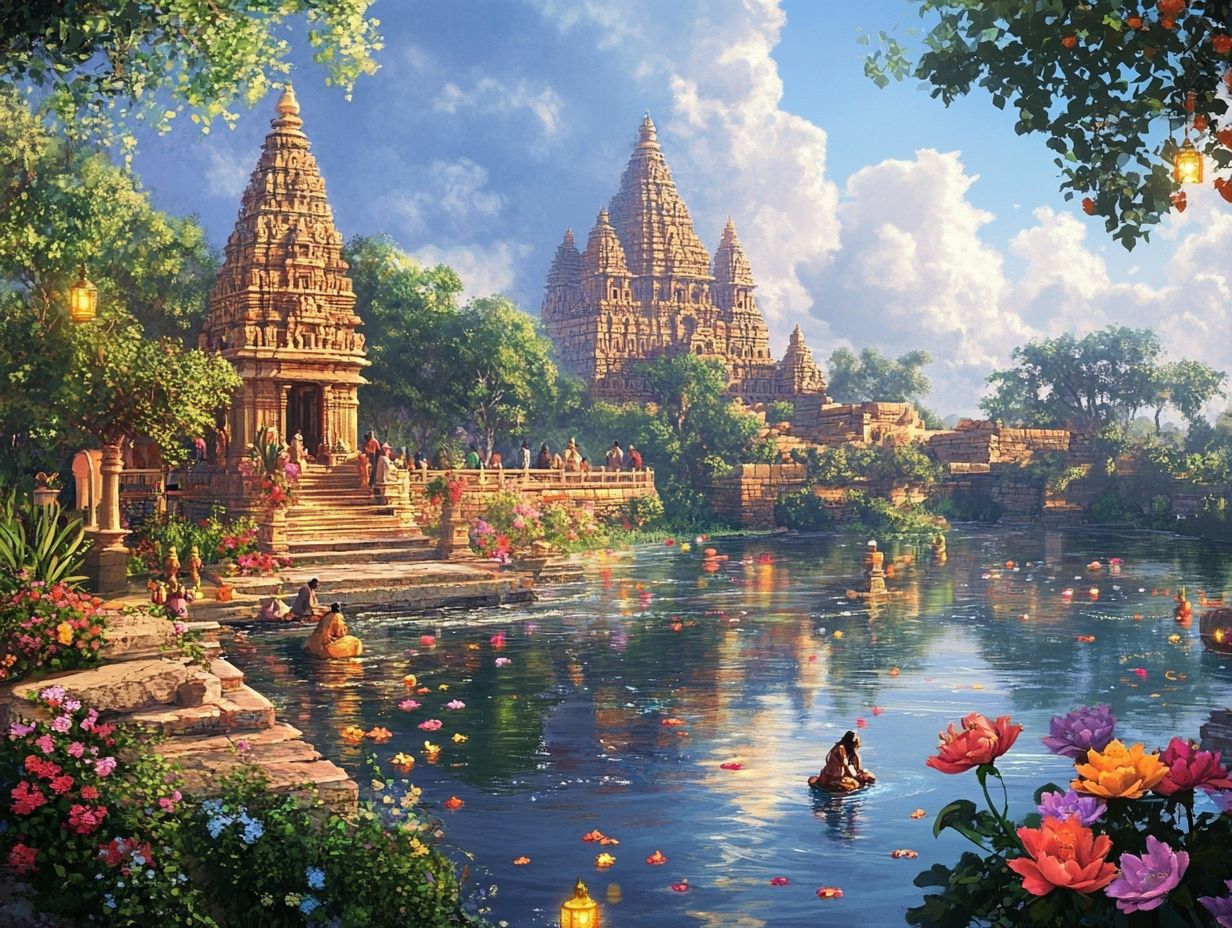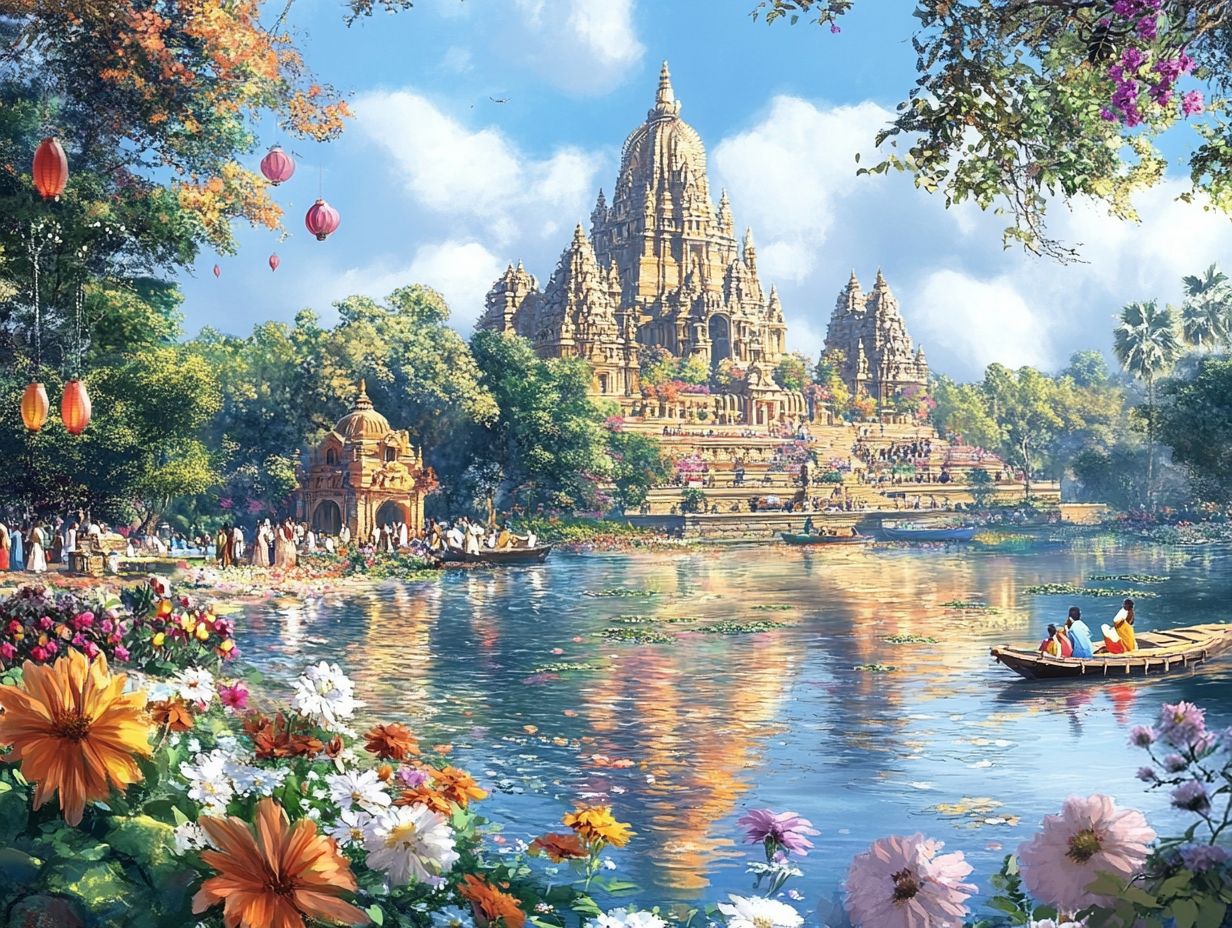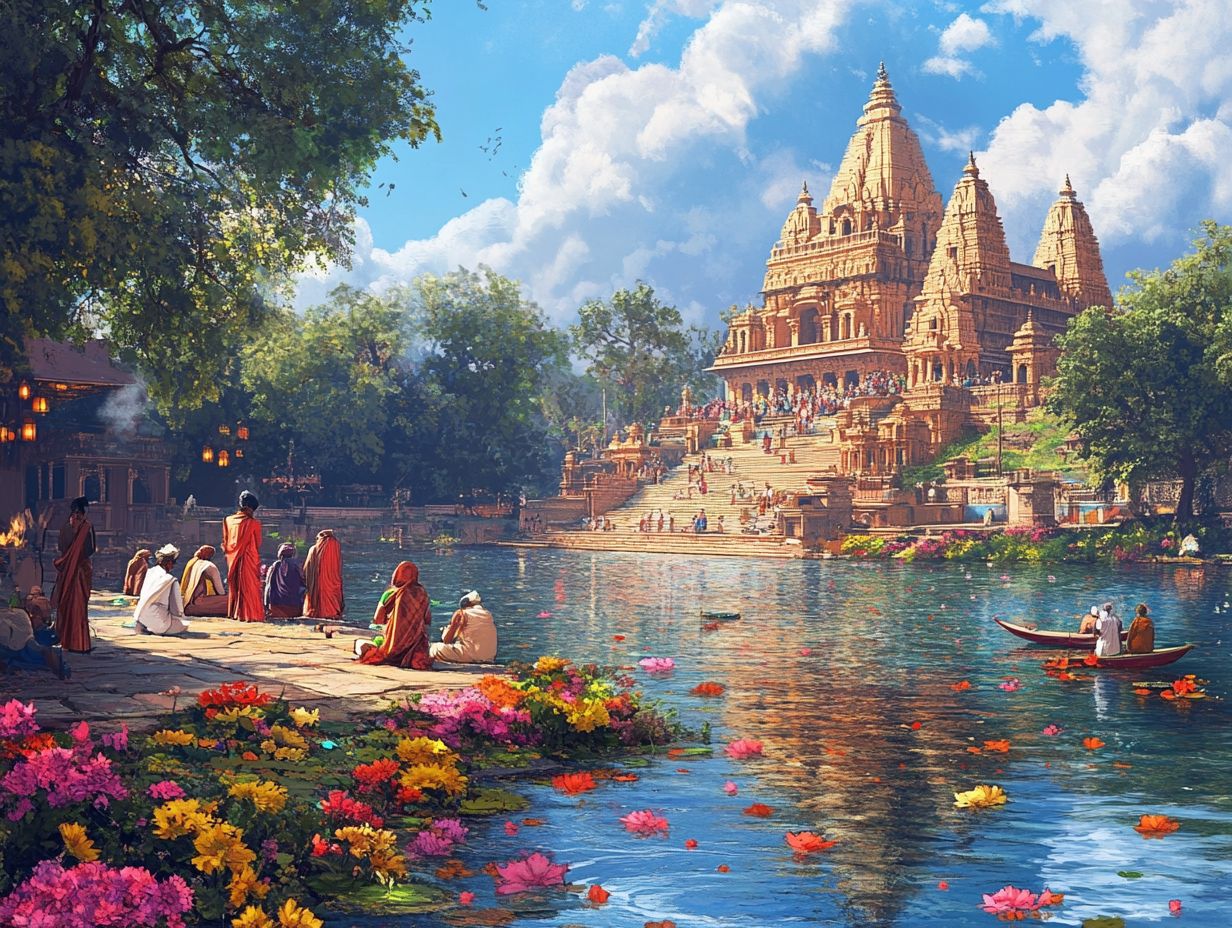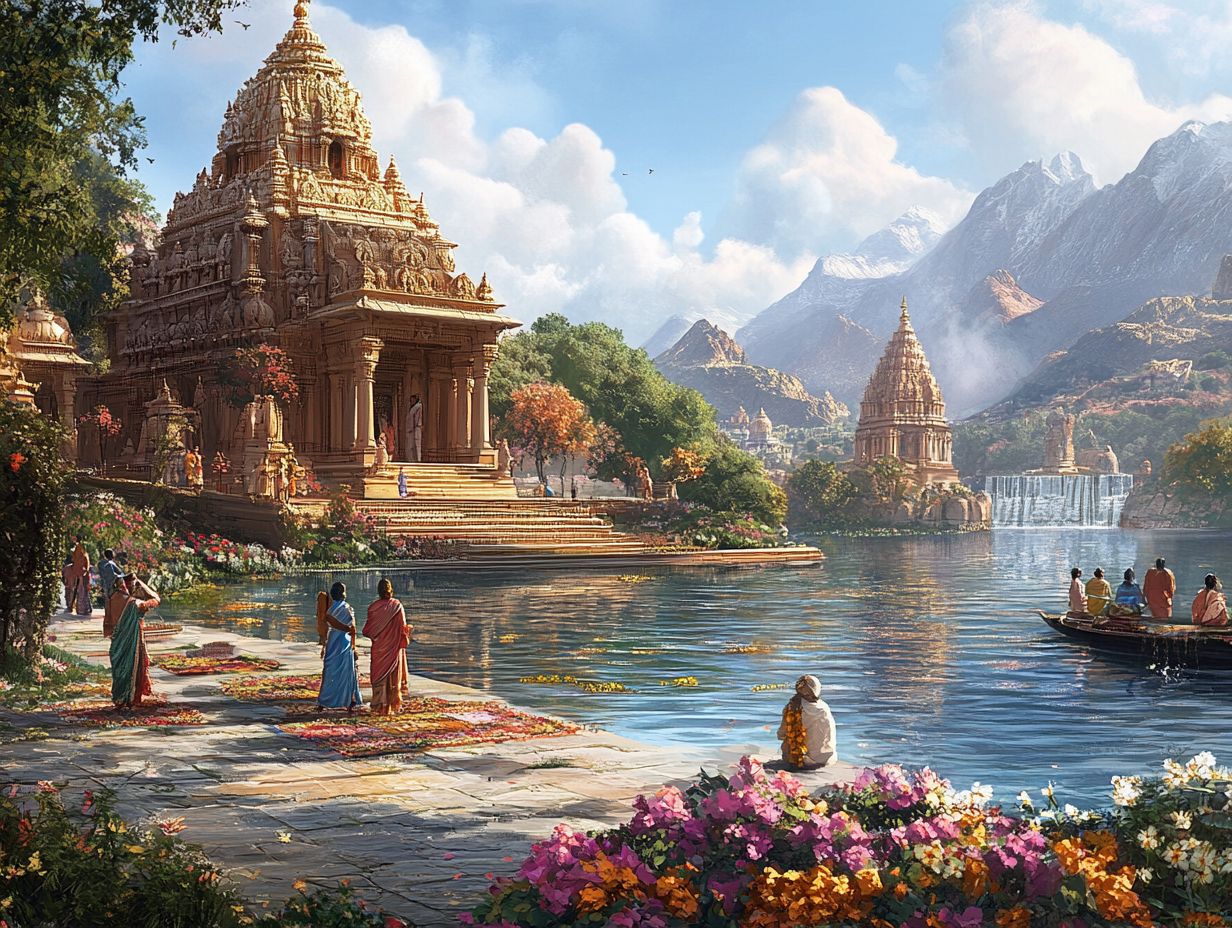Where Can You Find the Basic Beliefs of Hinduism?
Hinduism, recognized as one of the world’s oldest religions, presents a rich tapestry of beliefs and practices that have profoundly influenced the lives of millions. This exploration delves into the fundamental concepts of Hinduism, including the essence of Brahman, the significance of key Hindu deities, the guiding principle of dharma, and the vibrant rituals and festivals that shape religious ceremonies and cultural beliefs.
It further examines the profound ideas of reincarnation and the ultimate spiritual goals that inspire adherents. Ancient texts, such as the Vedas and Upanishads, illuminate these beliefs, revealing how they manifest in vibrant rituals, traditions, and religious practices.
The evolution of Hindu beliefs over time, including core principles like karma and moksha, is also considered, alongside their relevance in today s world. This journey invites a deeper understanding of the heart of Hinduism, encompassing its spiritual teachings, ethical living, and cultural beliefs.
What is Hinduism?

Hinduism, often referred to as Sanatana Dharma, stands as one of the oldest and most intricate belief systems globally, embodying a diverse array of traditions, practices, cultural beliefs, and philosophies that have developed over millennia.
Deeply rooted in ancient Indian culture, it encompasses an extensive collection of sacred texts, including the Vedas, Upanishads, and the Bhagavad Gita, which form the bedrock of its fundamental principles, ethical framework, and spiritual teachings.
This religion places significant emphasis on values such as Dharma, Karma, and Moksha, while showcasing a vibrant tapestry of deities, rituals, and festivals that capture its distinctly polytheistic essence. The practice of meditation, yoga, and chanting of mantras also plays a crucial role in spiritual growth and enlightenment.
What are the Basic Beliefs of Hinduism?
The fundamental tenets of Hinduism are intricately interlaced within its philosophical framework, showcasing concepts such as Dharma, which pertains to righteous duty; Karma, embodying the law of cause and effect; and the ultimate aspiration of Moksha, signifying liberation from the cycle of Reincarnation.
At the core of these beliefs lie the ideas of Atman, the individual soul, and Brahman, the universal soul. Together, these notions provide profound insights into the essence of existence, the ultimate reality, and the divine reality that is woven throughout the fabric of the universe.
What is the Concept of Brahman?
In Hindu philosophy, the concept of Brahman emerges as the ultimate and transcendent reality, serving as the source of the universe and encompassing both material and spiritual realms. Often depicted as formless, infinite, and imperishable, Brahman embodies the essence of all creation and represents the absolute truth and divine consciousness that underlies existence.
This profound notion holds significant importance across various Hindu traditions, wherein the relationship between Brahman and Atman the individual self becomes essential for understanding spirituality. Numerous schools of thought assert that the recognition of the unity between Brahman and Atman paves the way for spiritual liberation and enlightenment, illuminating the interconnectedness of all existence within the framework of Hindu cosmology and the nature of reality.
The concept transcends mere philosophical discussion; it beckons practitioners to engage in spiritual practices such as meditation and yoga that facilitate experiences of transcendence, thereby nurturing a deeper connection to the universe and a realization of their divine nature. Such insights inspire devotees to pursue a holistic understanding of existence, effectively bridging the gap between the material and spiritual worlds.
What are the Three Main Deities in Hinduism?
The three principal deities in Hinduism Brahma, Vishnu, and Shiva embody the essential divine functions of creation, preservation, and destruction, respectively, forming a foundational triad that underpins Hindu worship and belief. Each deity possesses unique qualities and attributes: Brahma is revered as the creator god, Vishnu as the preserver, and Shiva as the transformer, collectively illustrating the dynamic essence of divinity. Their worship and rituals are central to Hindu practices and religious values.
These deities are integral to Hindu cosmology, regarded not only as formidable manifestations of divine reality but also as pivotal figures in various rituals and cultural practices. For example, the creation of the universe by Brahma is celebrated through specific festivals that honor the cyclical nature of life. Similarly, the incarnations of Vishnu, such as Krishna and Rama, are revered during festivities that highlight themes of love, duty, and righteousness. Festivals like Diwali, Holi, and Navaratri are significant in worship and community gatherings.
In parallel, Shiva’s transformative power is emphasized during rites designed to invoke destruction for the purpose of renewal, fostering communal values through shared worship experiences. Together, these deities play a vital role in maintaining the balance of cosmic order, encouraging devotees to immerse themselves in vibrant traditions that forge connections to their heritage and strengthen bonds within their communities. The sacred sites such as temples and the Ganges River are central to pilgrimage and religious identity.
What is the Concept of Dharma?
The concept of Dharma in Hinduism emerges as a multifaceted principle, intricately woven into the fabric of duty, righteousness, and ethical conduct. It provides a guiding framework for individuals as they navigate their actions and life choices, embodying a moral order that sustains both society and the universe. Adherents are called to align their lives with their responsibilities and roles within the expansive cosmic tapestry. This principle also underpins the caste system, influencing social structure and duties.
To understand Dharma is to appreciate its profound influence on the social structure, where it delineates duties based on one s position within family and society, thereby fostering harmony and cohesion. On a personal level, individuals embark on their spiritual journeys through the prism of Dharma, which acts as a compass for moral decision-making, ensuring that their actions resonate with integrity and honor. The concept of non-violence, or ahimsa, is integral to Dharma, promoting compassion and ethical living.
The obligations to the community that arise from this principle promote collective well-being, inspiring individuals to contribute positively to those around them. Ultimately, Dharma is not merely a guideline for personal conduct; it serves as a foundational element that cultivates a balanced and prosperous society. Rites of passage and communal worship further reinforce these bonds within the Hindu community.
What is the Cycle of Reincarnation?

The cycle of Reincarnation, referred to as Samsara in Hinduism, embodies the perpetual journey of birth, death, and rebirth that the Atman (soul) undergoes until it achieves Moksha, or liberation. This cyclical process underscores the belief in the interconnectedness of life, where an individual’s actions (Karma) in prior lives significantly influence their future incarnations, shaping their spiritual odyssey. The concepts of samsara and karma are central to understanding the Hindu life cycle and moral conduct.
As individuals traverse the intricate maze of Samsara, they are often compelled to reflect on their actions and choices, which ultimately shape their Karma. This awareness nurtures a commitment to ethical living, as each decision carries the potential for positive or negative repercussions in their subsequent lives. Spiritual practices like meditation and yoga aid in this reflective process, fostering self-realization and spiritual growth.
Through practices such as meditation, seekers endeavor to cultivate mindfulness and self-awareness, deepening their connection to the essence of existence. By acknowledging the impermanence and interdependence of life, they aspire to transcend the cycle and attain liberation.
This profound journey not only transforms their spiritual practice but also enriches their overall experience of existence, guiding them toward greater harmony and enlightenment.
What is the Ultimate Goal of Hinduism?
The ultimate aspiration of Hinduism is the attainment of Moksha, or liberation, which marks the cessation of the cycle of Reincarnation and the realization of one’s true essence as Atman, inseparably united with Brahman. This profound spiritual enlightenment enables individuals to experience the divine reality and universal truth, allowing them to transcend the material existence that binds them.
To achieve this elevated state, a variety of paths can be pursued, each tailored to distinct personal inclinations and strengths. Philosophical inquiry invites deep contemplation of existence, encouraging seekers to engage with ancient texts and timeless wisdom such as the Vedas and Upanishads to uncover profound truths about the self and the universe.
In contrast, devotion, or Bhakti, inspires individuals to foster a heartfelt connection with the divine through prayer, rituals, and the singing of hymns, nurturing an emotional bond that has the power to elevate the spirit. Practices like Puja, chanting mantras, and engaging in festivals of light like Diwali also deepen this devotional connection.
Disciplined practices such as Yoga and meditation provide structured avenues for inner exploration, assisting practitioners in quieting the mind and attaining clarity, ultimately guiding them toward the sacred goal of Moksha. Asceticism, involving rigorous discipline and self-denial, is another path toward self-realization and liberation. Each path, while unique in its approach, invites the seeker to transcend limitations and embrace a more expansive understanding of reality and divine consciousness.
Where Can You Find the Basic Beliefs of Hinduism?
The fundamental tenets of Hinduism are intricately woven into its sacred texts, which stand as the authoritative scriptures that shape the spiritual and ethical foundation of the faith. These holy texts provide a wealth of philosophical and theological insight, guiding various religious practices and cultural beliefs.
Among these revered texts, the Vedas and Upanishads hold paramount significance, accompanied by the Bhagavad Gita and the Puranas. Each of these works enriches the profound tapestry of Hindu philosophy and informs the diverse religious practices, rituals, and spiritual teachings within the tradition. They are often recited during religious ceremonies and festivals, reinforcing their cultural and spiritual heritage.
What are the Sacred Texts of Hinduism?
The sacred texts of Hinduism, including the Vedas, Upanishads, and the Bhagavad Gita, are esteemed as the cornerstone scriptures that articulate the faith’s core principles, rituals, and ethical tenets. These holy texts encompass a rich tapestry of teachings on spirituality, philosophy, and social order, reflecting the vast diversity inherent within Hindu practices and beliefs.
Through these revered texts, adherents glean profound insights into the nature of existence, the self (Atman), and the intricate relationship with the divine (Brahman). The Vedas, which trace their origins to approximately 1500 BCE, represent the oldest layer of Sanskrit literature. They provide an extensive collection of hymns, incantations, and rituals that are essential to the Vedic tradition.
In contrast, the Upanishads, composed later, explore metaphysical themes, urging individuals to pursue knowledge and cultivate inner wisdom about the nature of reality and consciousness. Simultaneously, the Bhagavad Gita presents a compelling dialogue between Prince Arjuna and Lord Krishna, addressing ethical dilemmas and underscoring the significance of righteousness amid moral challenges.
Collectively, these texts shape the foundational values of dharma, karma, and moksha, offering profound guidance for both spiritual leaders and laypersons as they embark on their journeys toward ethical conduct and enlightenment. They also delve into concepts such as reincarnation, ahimsa (non-violence), and devotion.
Where Can You Find the Basic Beliefs of Hinduism in these Texts?
The fundamental beliefs of Hinduism are intricately interwoven throughout its sacred texts, each scripture offering unique interpretations and insights into essential concepts such as Dharma, Karma, Moksha, and reincarnation. From the philosophical dialogues of the Upanishads to the narrative teachings found in the Bhagavad Gita, these texts stand as invaluable resources for comprehending Hindu beliefs.
These scriptures not only articulate theoretical concepts but also provide practical guidance for individuals embarking on their spiritual journeys. Adherents engage with these texts during religious practices, including daily prayers, rituals, meditation, and festivals such as Diwali, Navaratri, and Holi, thereby embodying the ethical principles and moral conduct they espouse.
As one navigates through these teachings, they discover a framework for living a life aligned with righteousness, ultimately fostering personal growth and spiritual enlightenment. Through the exploration of such doctrines, the impact of these profound writings permeates everyday life, nurturing a deeper connection to the divine and fostering a sense of community through community worship and shared spiritual experiences.
How Do These Beliefs Influence Hindu Practices and Traditions?

Hindu beliefs profoundly shape the practices and traditions embraced by its followers, resulting in a rich tapestry of rituals, festivals, and communal activities that honor the fundamental principles of the faith, including devotion to Hindu deities and participation in life cycle ceremonies.
From daily acts of worship and meditation to grand festivities celebrating revered deities, such as Shakti and other Hindu deities, these practices not only reinforce individual and collective commitment to Dharma but also foster spiritual development within the community.
What are Some Common Hindu Practices and Rituals?
Common Hindu practices and rituals encompass a rich tapestry of activities, featuring daily prayers, meditation, yoga, and vibrant participation in festivals that honor deities and emphasize the importance of community. Integral to worship, rituals such as puja and the recitation of mantras enhance a devotee’s connection to the divine while promoting adherence to one s Dharma.
These practices serve not only as a pathway for personal spiritual growth but also as a means to fortify communal bonds through shared celebration and reverence. Festivals like Diwali, the festival of light, and Holi unite families and friends, embodying the spirit of unity and love, while regular gatherings for prayer services and temple visits reinforce the significance of shared faith in everyday life.
The act of performing rituals, whether at home shrines or in temples, reflects the values and teachings passed down through generations, underscoring respect for tradition and the collective responsibility to uphold spiritual customs within the community, including pilgrimages to sacred sites like the Ganges River and participation in rites of passage.
How Do These Practices Align with the Basic Beliefs of Hinduism?
Hindu practices are intricately woven into the fundamental beliefs of the religion, manifesting the principles of Dharma, Karma, and spirituality in the lives of its practitioners. Through rituals, prayers, meditation, and ethical conduct, these practices reinforce the foundational beliefs that guide adherents toward their ultimate goal of Moksha.
For instance, daily rituals such as Puja serve not only to honor deities but also to cultivate a sense of discipline and mindfulness, perfectly aligning with the principle of Dharma, which emphasizes righteous living. Similarly, the practice of Ahimsa, or non-violence, embodies a profound commitment to ethical conduct, underscoring the interconnectedness of all beings and fostering a harmonious existence that respects the sanctity of life.
The belief in Karma further encourages individuals to make conscious choices in their thoughts and actions, recognizing that every deed carries consequences that shape their spiritual journey through samsara. These examples demonstrate how the diverse practices within Hinduism not only embody its core philosophy but also guide adherents on their path toward enlightenment and liberation.
How Have these Beliefs Evolved and Adapted over Time?
The beliefs of Hinduism have undergone significant evolution and adaptation over time, shaped by various historical contexts, cultural exchanges, and sociopolitical changes that have influenced the religion’s practices and interpretations. This evolution reflects the dynamic and inclusive nature of Hinduism’s core principles.
From its ancient rituals to contemporary movements, the inherent adaptability of Hindu beliefs illustrates a dynamic faith that continues to resonate with modern followers. This ongoing transformation underscores the religion’s ability to remain relevant, reflecting a rich tapestry of tradition and innovation that captivates its adherents today. Hinduism s ability to integrate diverse cultural beliefs and practices has been key to its enduring relevance.
What Influences Have Shaped the Evolution of Hindu Beliefs?
Hindu beliefs have been intricately shaped by a myriad of influences, encompassing historical contexts, philosophical discourses, and interactions with diverse belief systems that have emerged over the millennia. The inherent dynamism of Hinduism enables it to adapt, reflecting the rich tapestry of traditions, sect doctrines, and major sects such as Vaishnavism, Shaivism, and Shaktism that coexist within the religion.
Notably, the profound impacts of colonialism introduced Western ideologies that challenged indigenous practices, prompting a critical re-examination of core beliefs. The advent of globalization further intensified this dialogue, as individuals from various faiths engaged in interfaith discussions that fostered a climate of pluralism and mutual respect.
These interactions have not only enriched Hindu practices but have also catalyzed a shift towards inclusivity, as sectarian divisions become increasingly pronounced against the backdrop of broader sociocultural influences. Consequently, this evolving landscape reveals a religion that transcends a static set of doctrines, presenting instead a vibrant tapestry woven from historical, cultural, and spiritual threads that invite exploration and deeper understanding. This openness to adaptation allows Hinduism to maintain its core principles while embracing innovation and inclusivity.
How Have Modern Interpretations of Hinduism Changed?

Modern interpretations of Hinduism have undergone significant transformation in response to global dynamics, cultural exchanges, and the challenges posed by secularism. This shift has prompted a reevaluation of traditional beliefs and practices. Contemporary perspectives often strive to reconcile ancient teachings with modern values, fostering a more inclusive and pluralistic understanding of Hindu identity and religious values.
The evolution of Hinduism can be traced to various influencing factors, particularly technological advancements that facilitate the global exchange of ideas and philosophies. As individuals from diverse backgrounds engage in interfaith dialogue, they introduce fresh insights that challenge conventional norms and nurture a sense of shared spiritual experience, promoting a broader understanding of universal truth and spiritual teachings.
Hindu reform movements have been instrumental in shaping modern Hinduism, advocating for social justice and promoting a reinterpretation of scriptures that align with contemporary ethical standards. These developments reflect a broader trend within global Hinduism, where adherence to tradition harmoniously coexists with an openness to innovation, ultimately enriching the faith and its practice in today’s modern world. This includes the integration of ethical living and compassion as central tenets.
Frequently Asked Questions
What are the basic beliefs of Hinduism?
The basic beliefs of Hinduism include the concepts of karma, dharma, reincarnation, and moksha. These beliefs are rooted in the Vedas, the most ancient Hindu scriptures, and are further explored in philosophical texts like the Upanishads and the Bhagavad Gita.
Where can I find the basic beliefs of Hinduism?
The basic beliefs of Hinduism can be found in numerous texts, including the Vedas, Upanishads, and Bhagavad Gita. These texts are considered the primary sources of Hindu teachings.
Are there different interpretations of the basic beliefs of Hinduism?
Yes, there are different interpretations of the basic beliefs of Hinduism. This is because Hinduism is a diverse religion with many different sects and traditions that may have varying interpretations of the core concepts, often influenced by regional and cultural beliefs.
Can non-Hindus also learn about the basic beliefs of Hinduism?
Yes, anyone can learn about the basic beliefs of Hinduism. Hinduism is an inclusive religion and welcomes people of all backgrounds to study and understand its teachings, including its sacred traditions, mythological stories, and cosmology.
Do all Hindus believe in the same basic beliefs?
No, not all Hindus believe in the exact same basic beliefs and core principles. As mentioned before, there are different interpretations and variations of these beliefs within the religion. These interpretations are often derived from various scriptures such as the Vedas, Upanishads, and the Bhagavad Gita. However, the core concepts remain the same, including key principles like Dharma, Karma, and Moksha. The belief in Reincarnation, Atman, and Brahman also plays a significant role in Hindu philosophy.
Are the basic beliefs and core principles of Hinduism static or do they change over time?
The basic beliefs of Hinduism are not static and have evolved over time. As the religion has developed and spread, new interpretations and understandings of these beliefs have emerged. These changes are reflected in practices, rituals, worship, and the reverence of Hindu deities. Temples, festivals, and religious ceremonies also showcase the dynamic nature of Hinduism. Additionally, spiritual teachings, meditation, yoga, and the concepts of samsara, ahimsa, devotion, and self-realization continue to shape the faith and its community over generations.
